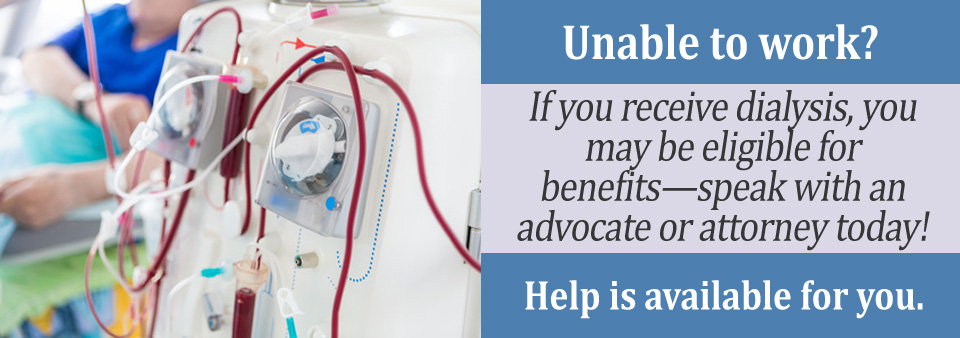Can you get disability for kidney dialysis?
The answer is yes, but kidney dialysis is a machine that performs the work the kidneys are supposed to do. Receiving support from a kidney dialysis machine indicates you suffer from a serious kidney disease, such as chronic kidney disease.
If you live with a serious kidney disease that requires dialysis, you might qualify to receive Social Security disability benefits. The Social Security Administration (SSA) offers two types of disability benefits programs that help recover the financial losses caused by acute kidney failure. However, you must meet the criteria established by the SSA to receive financial assistance.
Is Kidney Dialysis a Disability?
As living on a kidney dialysis indicates the presence of a serious kidney ailment, you have to demonstrate to the SSA that the symptoms associated with your kidney disease meet the medical guidelines published in the Blue Book. According to the Blue Book, kidney disease is listed under Section 6.00, which covers the broad medical conditions referred to as genitourinary disorders. To become eligible for financial assistance as offered under the Social Security disability program, you must meet one of three qualifying standards.
The first qualifying standard of living with kidney disease requires the operation of a dialysis machine to mimic the functions of the kidney. If you live on a kidney dialysis machine, you have met the first qualifying standard demanded by SSA guidelines.
Patients that do not live on kidney dialysis, but live with an advanced stage of kidney disease, qualify for financial assistance if they received a kidney transplant over the past 12 months. The third qualifying standard involves living with kidney disease that develops one or more of five life-threatening symptoms.

Types of Kidney Disease Conditions That Are Considered a Disability
Chronic kidney disease represents the most common type of kidney disease that requires dialysis. However, you can file a successful disability claim if another form of kidney disease develops that does not require dialysis.
For example, kidney stones, which are minerals that crystalize in the kidneys, can generate incredibly painful symptoms that make it impossible to hold down a job. Inflammation of the kidneys can develop the symptoms of a disease called glomerulonephritis. A severe urinary tract infection can result in a temporary medical condition that prevents a patient from working as well.
How to Get Disability Benefits for Kidney Dialysis
The key to getting disability benefits for kidney dialysis involves submitting convincing persuasive medical evidence to the SSA. You must demonstrate you live with a kidney dialysis machine that prevents you from earning a living.
Your physician plays a crucial role in helping you get a disability claim approved by submitting the results of diagnostic tests, as well as detailed descriptions of treatment programs and physical therapy sessions. One of the most important medical documents to submit to the SSA explains your prognosis for recovering from a severe kidney disease.
You can file a disability claim online, by phone, or in person.
Get Help With Your Kidney Dialysis Disability Claim
In addition to the support provided by your physician, a Social Security disability attorney may help you gather and organize the medical evidence you need to submit a convincing claim. Your lawyer can also monitor the progress of your claim to ensure it does not get lost in the SSA processing system. If the SSA denies your claim for disability benefits, an attorney can help you file an appeal for reconsideration.
Complete the Free Case Evaluation on this page to get connected with an independent, participating attorney who subscribes to the website.